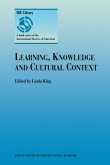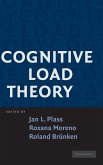Alex Kozulin / Boris Gindis / Vladimir S. Ageyev / Suzanne M. Miller (eds.)
Vygotsky's Educational Theory in Cultural Context
Herausgeber: Kozulin, Alex; Miller, Suzanne; Ageyev, Vladimir
Alex Kozulin / Boris Gindis / Vladimir S. Ageyev / Suzanne M. Miller (eds.)
Vygotsky's Educational Theory in Cultural Context
Herausgeber: Kozulin, Alex; Miller, Suzanne; Ageyev, Vladimir
- Broschiertes Buch
- Merkliste
- Auf die Merkliste
- Bewerten Bewerten
- Teilen
- Produkt teilen
- Produkterinnerung
- Produkterinnerung
Innovative ideas in educational psychology, learning, and instruction, originally formulated by Russian psychologist and educator Lev Vygotsky, are currently enjoying unprecedented popularity in the U.S., Latin America, Europe, and Russia. An international team of scholarly contributors provides comprehensive coverage of all the main concepts of Vygotsky's sociocultural theory. They emphasize its importance for the understanding of child development, and propose specific classroom applications.
Andere Kunden interessierten sich auch für
![Vygotsky's Educational Theory in Cultural Context Vygotsky's Educational Theory in Cultural Context]() Alex Kozulin / Boris Gindis / Vladimir S. Ageyev / Suzanne M. Miller (eds.)Vygotsky's Educational Theory in Cultural Context129,99 €
Alex Kozulin / Boris Gindis / Vladimir S. Ageyev / Suzanne M. Miller (eds.)Vygotsky's Educational Theory in Cultural Context129,99 €![Vygotsky's Theory in Early Childhood Education and Research Vygotsky's Theory in Early Childhood Education and Research]() Vygotsky's Theory in Early Childhood Education and Research204,99 €
Vygotsky's Theory in Early Childhood Education and Research204,99 €![Learning, Knowledge and Cultural Context Learning, Knowledge and Cultural Context]() Linda King (ed.)Learning, Knowledge and Cultural Context42,99 €
Linda King (ed.)Learning, Knowledge and Cultural Context42,99 €![School Counselling in a Chinese Context School Counselling in a Chinese Context]() School Counselling in a Chinese Context217,99 €
School Counselling in a Chinese Context217,99 €![Cognitive Load Theory Cognitive Load Theory]() Cognitive Load Theory117,99 €
Cognitive Load Theory117,99 €![Helping Nonmainstream Families Achieve Equity Within the Context of School-Based Consulting Helping Nonmainstream Families Achieve Equity Within the Context of School-Based Consulting]() Helping Nonmainstream Families Achieve Equity Within the Context of School-Based Consulting52,99 €
Helping Nonmainstream Families Achieve Equity Within the Context of School-Based Consulting52,99 €![The Role of Culture and Cultural Context in Evaluation The Role of Culture and Cultural Context in Evaluation]() The Role of Culture and Cultural Context in Evaluation109,99 €
The Role of Culture and Cultural Context in Evaluation109,99 €-
-
-
Innovative ideas in educational psychology, learning, and instruction, originally formulated by Russian psychologist and educator Lev Vygotsky, are currently enjoying unprecedented popularity in the U.S., Latin America, Europe, and Russia. An international team of scholarly contributors provides comprehensive coverage of all the main concepts of Vygotsky's sociocultural theory. They emphasize its importance for the understanding of child development, and propose specific classroom applications.
Hinweis: Dieser Artikel kann nur an eine deutsche Lieferadresse ausgeliefert werden.
Hinweis: Dieser Artikel kann nur an eine deutsche Lieferadresse ausgeliefert werden.
Produktdetails
- Produktdetails
- Verlag: Cambridge University Press
- Seitenzahl: 494
- Erscheinungstermin: 15. September 2003
- Englisch
- Abmessung: 229mm x 152mm x 26mm
- Gewicht: 709g
- ISBN-13: 9780521528832
- ISBN-10: 0521528836
- Artikelnr.: 22425470
- Herstellerkennzeichnung
- Produktsicherheitsverantwortliche/r
- Europaallee 1
- 36244 Bad Hersfeld
- gpsr@libri.de
- Verlag: Cambridge University Press
- Seitenzahl: 494
- Erscheinungstermin: 15. September 2003
- Englisch
- Abmessung: 229mm x 152mm x 26mm
- Gewicht: 709g
- ISBN-13: 9780521528832
- ISBN-10: 0521528836
- Artikelnr.: 22425470
- Herstellerkennzeichnung
- Produktsicherheitsverantwortliche/r
- Europaallee 1
- 36244 Bad Hersfeld
- gpsr@libri.de
List of contributors; Series Foreword; Introduction: sociocultural theory
and education: students, teachers and knowledge Alex Kozulin, Boris Gindis,
Vladimir S. Ageyev, and Suzanne M. Miller; Part I. Concepts and Paradigms:
1. Psychological tools and mediated learning Alex Kozulin; 2. The zone of
proximal development in Vygotsky's analysis of learning and instruction
Seth Chaiklin; 3. Vygotsky's doctrine of scientific concepts: its role for
contemporary education Yuriy V. Karpov; 4. Some cognitive tools of literacy
Kieran Egan and Natalia Gajdamaschko; 5. Dynamic assessment of the evolving
cognitive functions in children Carol S. Lidz and Boris Gindis; Part II.
Development and Learning: 6. Periods in child development: Vygotsky's
perspective Holbrook Mahn; 7. Development through the lifespan: a
neo-Vygotskian approach Yuriy V. Karpov; 8. Learning and development of
preschool children from the Vygotskian perspective Elena Bodrova and
Deborah J. Leong; 9. The learning activity in the first years of schooling:
the developmental path towards reflection Galina Zuckerman; 10. Remediation
though education: socio/cultural theory and children with special needs
Boris Gindis; Part III. Sociocultural Theory Application in the Classroom:
11. Cultural-historical theory and mathematics education Jean Schmittau;
12. Socio/cultural theory and the practice of teaching historical concepts
Jacques Haenen, Hubert Schrijuemakers, and Job Stufkens; 13. Formation of
learning activity and theoretical thinking in science teaching Hartmut
Giest and Joaclum Lompscher; 14. How literature discussion shapes thinking:
ZPDs for teaching/learning habits of the heart and mind Suzanne M. Miller;
15. Beyond cognition: a Vygotskian perspective on emotionality and
teachers' professional lives Anne DiPardo and Christine Potter; Part IV.
Diverse Learners and Contexts of Education: 16. Interpersonal communication
and internalization in the second language classroom James P. Lantolf; 17.
Mediation in cognitive socialization: the influence of socioeconomic status
Pedro R. Portes and Jennifer A. Vadeboncoeur; 18. Cultural modeling: CHAT
as a lens for understanding instructional discourse based on
African-American English discourse patterns Carol D. Lee; 19. The relations
of learning and student social class: toward re-'socializing' sociocultural
learning theory Carolyn P. Panofsky; 20. Vygotsky in the mirror of cultural
interpretations Vladimir S. Agayev; Indexes.
and education: students, teachers and knowledge Alex Kozulin, Boris Gindis,
Vladimir S. Ageyev, and Suzanne M. Miller; Part I. Concepts and Paradigms:
1. Psychological tools and mediated learning Alex Kozulin; 2. The zone of
proximal development in Vygotsky's analysis of learning and instruction
Seth Chaiklin; 3. Vygotsky's doctrine of scientific concepts: its role for
contemporary education Yuriy V. Karpov; 4. Some cognitive tools of literacy
Kieran Egan and Natalia Gajdamaschko; 5. Dynamic assessment of the evolving
cognitive functions in children Carol S. Lidz and Boris Gindis; Part II.
Development and Learning: 6. Periods in child development: Vygotsky's
perspective Holbrook Mahn; 7. Development through the lifespan: a
neo-Vygotskian approach Yuriy V. Karpov; 8. Learning and development of
preschool children from the Vygotskian perspective Elena Bodrova and
Deborah J. Leong; 9. The learning activity in the first years of schooling:
the developmental path towards reflection Galina Zuckerman; 10. Remediation
though education: socio/cultural theory and children with special needs
Boris Gindis; Part III. Sociocultural Theory Application in the Classroom:
11. Cultural-historical theory and mathematics education Jean Schmittau;
12. Socio/cultural theory and the practice of teaching historical concepts
Jacques Haenen, Hubert Schrijuemakers, and Job Stufkens; 13. Formation of
learning activity and theoretical thinking in science teaching Hartmut
Giest and Joaclum Lompscher; 14. How literature discussion shapes thinking:
ZPDs for teaching/learning habits of the heart and mind Suzanne M. Miller;
15. Beyond cognition: a Vygotskian perspective on emotionality and
teachers' professional lives Anne DiPardo and Christine Potter; Part IV.
Diverse Learners and Contexts of Education: 16. Interpersonal communication
and internalization in the second language classroom James P. Lantolf; 17.
Mediation in cognitive socialization: the influence of socioeconomic status
Pedro R. Portes and Jennifer A. Vadeboncoeur; 18. Cultural modeling: CHAT
as a lens for understanding instructional discourse based on
African-American English discourse patterns Carol D. Lee; 19. The relations
of learning and student social class: toward re-'socializing' sociocultural
learning theory Carolyn P. Panofsky; 20. Vygotsky in the mirror of cultural
interpretations Vladimir S. Agayev; Indexes.
List of contributors; Series Foreword; Introduction: sociocultural theory
and education: students, teachers and knowledge Alex Kozulin, Boris Gindis,
Vladimir S. Ageyev, and Suzanne M. Miller; Part I. Concepts and Paradigms:
1. Psychological tools and mediated learning Alex Kozulin; 2. The zone of
proximal development in Vygotsky's analysis of learning and instruction
Seth Chaiklin; 3. Vygotsky's doctrine of scientific concepts: its role for
contemporary education Yuriy V. Karpov; 4. Some cognitive tools of literacy
Kieran Egan and Natalia Gajdamaschko; 5. Dynamic assessment of the evolving
cognitive functions in children Carol S. Lidz and Boris Gindis; Part II.
Development and Learning: 6. Periods in child development: Vygotsky's
perspective Holbrook Mahn; 7. Development through the lifespan: a
neo-Vygotskian approach Yuriy V. Karpov; 8. Learning and development of
preschool children from the Vygotskian perspective Elena Bodrova and
Deborah J. Leong; 9. The learning activity in the first years of schooling:
the developmental path towards reflection Galina Zuckerman; 10. Remediation
though education: socio/cultural theory and children with special needs
Boris Gindis; Part III. Sociocultural Theory Application in the Classroom:
11. Cultural-historical theory and mathematics education Jean Schmittau;
12. Socio/cultural theory and the practice of teaching historical concepts
Jacques Haenen, Hubert Schrijuemakers, and Job Stufkens; 13. Formation of
learning activity and theoretical thinking in science teaching Hartmut
Giest and Joaclum Lompscher; 14. How literature discussion shapes thinking:
ZPDs for teaching/learning habits of the heart and mind Suzanne M. Miller;
15. Beyond cognition: a Vygotskian perspective on emotionality and
teachers' professional lives Anne DiPardo and Christine Potter; Part IV.
Diverse Learners and Contexts of Education: 16. Interpersonal communication
and internalization in the second language classroom James P. Lantolf; 17.
Mediation in cognitive socialization: the influence of socioeconomic status
Pedro R. Portes and Jennifer A. Vadeboncoeur; 18. Cultural modeling: CHAT
as a lens for understanding instructional discourse based on
African-American English discourse patterns Carol D. Lee; 19. The relations
of learning and student social class: toward re-'socializing' sociocultural
learning theory Carolyn P. Panofsky; 20. Vygotsky in the mirror of cultural
interpretations Vladimir S. Agayev; Indexes.
and education: students, teachers and knowledge Alex Kozulin, Boris Gindis,
Vladimir S. Ageyev, and Suzanne M. Miller; Part I. Concepts and Paradigms:
1. Psychological tools and mediated learning Alex Kozulin; 2. The zone of
proximal development in Vygotsky's analysis of learning and instruction
Seth Chaiklin; 3. Vygotsky's doctrine of scientific concepts: its role for
contemporary education Yuriy V. Karpov; 4. Some cognitive tools of literacy
Kieran Egan and Natalia Gajdamaschko; 5. Dynamic assessment of the evolving
cognitive functions in children Carol S. Lidz and Boris Gindis; Part II.
Development and Learning: 6. Periods in child development: Vygotsky's
perspective Holbrook Mahn; 7. Development through the lifespan: a
neo-Vygotskian approach Yuriy V. Karpov; 8. Learning and development of
preschool children from the Vygotskian perspective Elena Bodrova and
Deborah J. Leong; 9. The learning activity in the first years of schooling:
the developmental path towards reflection Galina Zuckerman; 10. Remediation
though education: socio/cultural theory and children with special needs
Boris Gindis; Part III. Sociocultural Theory Application in the Classroom:
11. Cultural-historical theory and mathematics education Jean Schmittau;
12. Socio/cultural theory and the practice of teaching historical concepts
Jacques Haenen, Hubert Schrijuemakers, and Job Stufkens; 13. Formation of
learning activity and theoretical thinking in science teaching Hartmut
Giest and Joaclum Lompscher; 14. How literature discussion shapes thinking:
ZPDs for teaching/learning habits of the heart and mind Suzanne M. Miller;
15. Beyond cognition: a Vygotskian perspective on emotionality and
teachers' professional lives Anne DiPardo and Christine Potter; Part IV.
Diverse Learners and Contexts of Education: 16. Interpersonal communication
and internalization in the second language classroom James P. Lantolf; 17.
Mediation in cognitive socialization: the influence of socioeconomic status
Pedro R. Portes and Jennifer A. Vadeboncoeur; 18. Cultural modeling: CHAT
as a lens for understanding instructional discourse based on
African-American English discourse patterns Carol D. Lee; 19. The relations
of learning and student social class: toward re-'socializing' sociocultural
learning theory Carolyn P. Panofsky; 20. Vygotsky in the mirror of cultural
interpretations Vladimir S. Agayev; Indexes.








